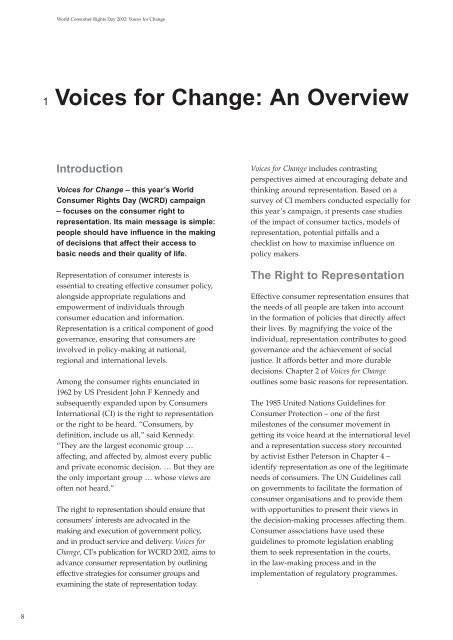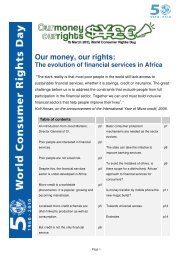Voices for Change: the Consumer Right to Representation
Voices for Change: the Consumer Right to Representation
Voices for Change: the Consumer Right to Representation
You also want an ePaper? Increase the reach of your titles
YUMPU automatically turns print PDFs into web optimized ePapers that Google loves.
8<br />
World <strong>Consumer</strong> <strong>Right</strong>s Day 2002: <strong>Voices</strong> <strong>for</strong> <strong>Change</strong><br />
1 <strong>Voices</strong> <strong>for</strong> <strong>Change</strong>: An Overview<br />
Introduction<br />
<strong>Voices</strong> <strong>for</strong> <strong>Change</strong> – this year’s World<br />
<strong>Consumer</strong> <strong>Right</strong>s Day (WCRD) campaign<br />
– focuses on <strong>the</strong> consumer right <strong>to</strong><br />
representation. Its main message is simple:<br />
people should have influence in <strong>the</strong> making<br />
of decisions that affect <strong>the</strong>ir access <strong>to</strong><br />
basic needs and <strong>the</strong>ir quality of life.<br />
<strong>Representation</strong> of consumer interests is<br />
essential <strong>to</strong> creating effective consumer policy,<br />
alongside appropriate regulations and<br />
empowerment of individuals through<br />
consumer education and in<strong>for</strong>mation.<br />
<strong>Representation</strong> is a critical component of good<br />
governance, ensuring that consumers are<br />
involved in policy-making at national,<br />
regional and international levels.<br />
Among <strong>the</strong> consumer rights enunciated in<br />
1962 by US President John F Kennedy and<br />
subsequently expanded upon by <strong>Consumer</strong>s<br />
International (CI) is <strong>the</strong> right <strong>to</strong> representation<br />
or <strong>the</strong> right <strong>to</strong> be heard. “<strong>Consumer</strong>s, by<br />
definition, include us all,” said Kennedy.<br />
“They are <strong>the</strong> largest economic group …<br />
affecting, and affected by, almost every public<br />
and private economic decision. … But <strong>the</strong>y are<br />
<strong>the</strong> only important group … whose views are<br />
often not heard.”<br />
The right <strong>to</strong> representation should ensure that<br />
consumers’ interests are advocated in <strong>the</strong><br />
making and execution of government policy,<br />
and in product service and delivery. <strong>Voices</strong> <strong>for</strong><br />
<strong>Change</strong>, CI’s publication <strong>for</strong> WCRD 2002, aims <strong>to</strong><br />
advance consumer representation by outlining<br />
effective strategies <strong>for</strong> consumer groups and<br />
examining <strong>the</strong> state of representation <strong>to</strong>day.<br />
<strong>Voices</strong> <strong>for</strong> <strong>Change</strong> includes contrasting<br />
perspectives aimed at encouraging debate and<br />
thinking around representation. Based on a<br />
survey of CI members conducted especially <strong>for</strong><br />
this year’s campaign, it presents case studies<br />
of <strong>the</strong> impact of consumer tactics, models of<br />
representation, potential pitfalls and a<br />
checklist on how <strong>to</strong> maximise influence on<br />
policy makers.<br />
The <strong>Right</strong> <strong>to</strong> <strong>Representation</strong><br />
Effective consumer representation ensures that<br />
<strong>the</strong> needs of all people are taken in<strong>to</strong> account<br />
in <strong>the</strong> <strong>for</strong>mation of policies that directly affect<br />
<strong>the</strong>ir lives. By magnifying <strong>the</strong> voice of <strong>the</strong><br />
individual, representation contributes <strong>to</strong> good<br />
governance and <strong>the</strong> achievement of social<br />
justice. It af<strong>for</strong>ds better and more durable<br />
decisions. Chapter 2 of <strong>Voices</strong> <strong>for</strong> <strong>Change</strong><br />
outlines some basic reasons <strong>for</strong> representation.<br />
The 1985 United Nations Guidelines <strong>for</strong><br />
<strong>Consumer</strong> Protection – one of <strong>the</strong> first<br />
miles<strong>to</strong>nes of <strong>the</strong> consumer movement in<br />
getting its voice heard at <strong>the</strong> international level<br />
and a representation success s<strong>to</strong>ry recounted<br />
by activist Es<strong>the</strong>r Peterson in Chapter 4 –<br />
identify representation as one of <strong>the</strong> legitimate<br />
needs of consumers. The UN Guidelines call<br />
on governments <strong>to</strong> facilitate <strong>the</strong> <strong>for</strong>mation of<br />
consumer organisations and <strong>to</strong> provide <strong>the</strong>m<br />
with opportunities <strong>to</strong> present <strong>the</strong>ir views in<br />
<strong>the</strong> decision-making processes affecting <strong>the</strong>m.<br />
<strong>Consumer</strong> associations have used <strong>the</strong>se<br />
guidelines <strong>to</strong> promote legislation enabling<br />
<strong>the</strong>m <strong>to</strong> seek representation in <strong>the</strong> courts,<br />
in <strong>the</strong> law-making process and in <strong>the</strong><br />
implementation of regula<strong>to</strong>ry programmes.






![pkef]Qmf eg]sf] s] xf] < - Consumers International](https://img.yumpu.com/6479658/1/184x260/pkefqmf-egsf-s-xf-consumers-international.jpg?quality=85)
